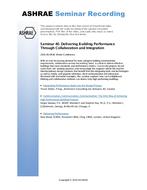For some time, the absorption heat pump has been considered as a possible scheme for upgrading low-temperature waste heat, which is available in very large quantities.’ The heat pump, designed to provide a temperature boost typically from 60% (140 F) to 120% (250 F), thus makes low-grade heat useful for industrial and other applications. A recent study on the different means for waste heat utilization has shown the absorption heat pump to be one of the more promising among the other systems proposed for this purpose.
Unlike most other heat pumps, the absorption system relies on the waste heat itself as a source of power and does not require electricity or other primary energy for its operation (except for parasitics, which may be kept small). Although the absorption cycle has been used extensively in cooling systems, relatively little work has been done on the industrial heat pump application. An experimental study of a lithium bromide absorption refrigerating and single-stage heat pump machine was carried out years ago at the Leningrad Technological Institute of the Refrigerating Industry. In the heat pump mode, which was fired exclusively with waste heat, temperature boosts of 30 C (54 F) were obtained with firing temperatures of 60% (140 F) and cooling water at 1.4% (34 F).
A singlestage system employing an ammonia-water solution, operating with a 65’C (149 F) heat source and 15’C (59 F) sink, was built and experimented with.3 An ammonia-water absorption-resorption heat pump developed at the French Institute of Petroleum achieved good efficiencies for modest temperature boosts [about 30’C (54 F)] at heat input temperatures above 70% (158 F).4 Thermodynamic and general feasibility analyses were done for other working materials and for different applications. This study considers the open-cycle absorption heat pump and its potential for recovering low-temperature waste heat in the absence of a much lower temperature heat sink.. This would occur typically in warm, humid climates or where cooling water is not readily available. A cycle analysis is performed with suitable working materials. The performance of individual components and of the overall system is studied.
Citation: Symposium, ASHRAE Transactions, Volume 88, Part 1, Houston, TX
Product Details
- Published:
- 1982
- Number of Pages:
- 19
- File Size:
- 1 file , 1.3 MB
- Product Code(s):
- D-HO-82-05-3


